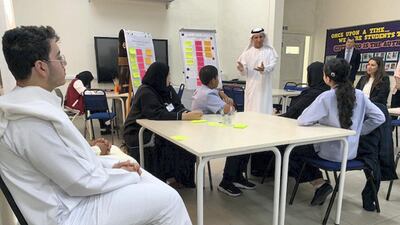More than 120,000 pupils and staff from across private schools in Dubai will take part in two well-being surveys from Sunday.
The combined annual study, organised by the Knowledge and Human Development Authority, is expected to take five weeks to complete.
Officials from KHDA, the emirate's education regulator, said participants will be asked between 50 and 60 questions each.
Researchers hope their answers will offer new insight into how individuals are coping with demands of life in the classroom.
“We have added new questions that hone in on digital technology use, social media interaction as well as a pupil’s sleep and calmness rating,” said Hind Al Mualla, chief of creativity, happiness and innovation at KHDA.
The Dubai Student Wellbeing Census will survey about 100,000 private school pupils while the Adults@School Wellbeing Survey will focus on 20,000 staff.
In total, 181 schools will take part in the study, which was first launched by KHDA in 2017.
The results of both surveys will be released in March 2020, with authorities using the data to create action plans to improve well-being across Dubai schools.
This year, KHDA has adapted the pupil census to include questions on sleep patterns and internet use among children and young teenagers.
Results of the 2018 study revealed that of 95,000 pupils surveyed, 89 per cent said they were more likely to be satisfied with their life if they got a good night's sleep.
As a result, the KHDA now wants to put “a sharper focus on what factors are limiting or impacting a pupil’s sleep cycle”, said Ms Al Mualla.
The Adults@School Wellbeing Survey was first introduced last year, throwing a spotlight on how school staff, especially teachers, needed support at work.
It found that more than 40 per cent of participants said they were ‘just getting by’, while five per cent said they were ‘really struggling’. Some 24 per cent said they were ‘consistently thriving’.
Ghadeer Abu Shamat, principal at Al Khaleej National School in Dubai, said the surveys had proved an “eye opener”.
“Once we analysed our 2018 results we realised we needed to fill a few gaps when it came to personal development among our pupils,” she said.
“We realised some pupils were not arriving to school on time because they were not getting enough sleep at home.”
Abir Saleh, well-being coordinator at the school, said the study also revealed that some pupils were unsatisfied with their lives at home.
“We realised we needed to be more involved with parents so as to open up discussions about problems that pupils might be having at home,” she said.
“We also put on lectures for parents about how to deal with children going through adolescent changes, even financial planning workshops for families.”
Ibrahim Khalil, year leader at Al Khaleej National School in the emirate, said the staff survey had given voice to school employees.
“It makes you feel like your opinion matters, your well-being matters,” he said. “By filling out the survey last year I was able to take a step back, breakdown my daily workload and make some changes.
“Before, my work-life balance was lacking. Now, I make sure I do not log on to work emails after 5pm and I exercise for an hour every day before work as it gets me in the right headspace.
“More focus on mental and physical health in school for both teachers and pupils would be great and reduced working hours would help increase productivity and well-being.”


